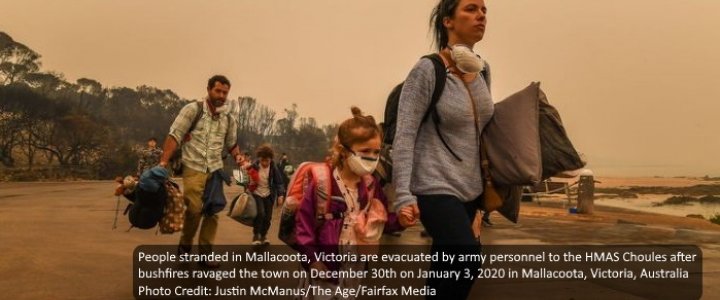In recent weeks, there has been much discussion about how organisations receiving funds for bushfire relief use the money received. We can all agree that donations from the Australian community in response to the bushfire crisis should be used in the best way possible. But what is the best way? And what can you expect to know about how the money is spent?
Here we explain what to look for in establishing that you have donated to a reputable organisation, and why fast expenditure of funds might not be the best indicator of money well-spent.
Check that the organisation you’re donating to is the real deal
When we’re keen to help – and pushed for time – details can pass us by. If an organisation is a registered charity, their website should clearly display the organisation name, address, general purpose, and an Australian Business Number (ABN). You can check the information provided by searching for an organisation’s ABN on the Australian Charities and Not-for-profits Commission (ACNC) Charity Register. The website may also indicate whether your donation is tax deductible. You can check this under the tab “deductible gift recipient status” on the Government’s ABN lookup site here.
A donations page should explain how funds raised through an appeal will be spent. In the immediate aftermath of a disaster, this information will be quite general, as organisations collect the information that they need. However, as this information becomes available, websites should be updated, providing information to donors with more specific activities, covering what, where and how the charity will be implementing their relief effort. If you can’t find this information, you can contact them and ask.
Understanding needs, planning for them and then responding effectively can take time
It can be frustrating to hear tales of bushfire victims experiencing hardship when we’ve already donated money to help. A critical part of upholding public trust, however, is ensuring that money is used effectively. To do this, staff and volunteers on the ground will carefully assess what is needed.
Unfortunately, not every individual who seeks assistance in the wake of a crisis will be a genuine case – and it takes time to verify the information provided. Moreover, a crisis such as the current bushfires is simply not the same as a point-in-time emergency like for example, a cyclone.
Organisations will be planning for how they can balance the urgent needs of impacted families now, whilst ensuring sufficient funds remain for the possibility there will be many more impacted in the weeks and months to come. The scale of the current bushfire crisis has made the challenge of this process enormous.
Organisations will be working through phases of assessing complex needs, locating and identifying vulnerable groups, delivering immediate food, water, and shelter relief, then activating appropriate cash transfer programs, whilst simultaneously factoring in newly affected households, and planning ongoing rebuilds. Large charities will be doing this collaboratively, consulting community stakeholders, whilst also liaising with other charities to ensure relief is not duplicated, or areas overlooked. Established charities have decades of experience in this kind of planning, but it is complex and time consuming.
Look for indicators that the organisation is transparent
In the context of the current debate, it’s important to recognise that running an effective organisation costs money, even when it’s not-for-profit. Employing skilled staff and recruiting volunteers, the technology to collect your donation securely and keep your data private, accounting software to track where the money went, the expenses list goes on. Fortunately, many established charities already have good systems up and running and can work to keep these costs as low as possible. But this should not be confused with an expectation that they are non-existent, and to suggest this is the case is misleading.
In the case that a charity does pledge to ensure 100% of funds received will go directly to a cause, this cost will need to be absorbed elsewhere. Finding another source to pay this can be extremely difficult.
Some of Australia’s largest charities have run deficits in recent years to keep critical programs such as shelters, food deliveries and blood banks running in the absence of ongoing donations, without attempting to absorb the costs of new programs. This expectation undermines the value of the charitable sector’s contribution to our communities. An organisation should be able to explain how funds were spent in a transparent and accountable way, and this is what you should expect of them, not delivery for free.
Check whether an organisation is a signatory to an industry standard
Some charities sign up to standards that regulate their work, stipulating approaches to fundraising and other activities. Whilst we do not regulate fundraising for domestic emergency appeals, for overseas development and humanitarian work members of the Australian Council for International Development (ACFID) sign up to the ACFID Code of Conduct, and choose to report to ACFID on their compliance.
The Code prescribes a standard that sets the bar higher than Government regulation, and is indicative of their commitment to accountability. Importantly, the Code of Conduct also has an independent complaints handling mechanism, through which a member of the public, a beneficiary, any donor or stakeholder can make a complaint about Code signatories. You can read a list of the organisations signed up to the Code on ACFID’s website.
Finally, when you find an organisation that deserves your trust, consider becoming an ongoing supporter
One of the reasons established charities were able to mobilise quickly, setting up evacuation centers and organising relief in the bushfire crisis is because they have ongoing staff and programs. These programs fill critical gaps in social service delivery, and help those in communities both here and overseas who need healthcare, shelter, protection and food every day, not just in an emergency.
One positive that can arise from a crisis like this is that the generosity of the Australian public shines, and organisations such as charities are able to harness this generosity to extend critical relief to those who need it. As a donor, you can help this to be an everyday reality.
When you find a charity that deserves your trust, consider becoming part of their regular giving program. It feels good to give well.

Jocelyn Condon
Jocelyn Condon, Director of Development Effectiveness, ACFID
Jocelyn leads ACFID’s effectiveness and engagement team, which manages NGO membership, work under the ACFID Code of Conduct, and ACFID’s learning and innovation program. She has recently returned from four years in Timor-Leste where she worked with the International Labor Organisation, and is studying a masters of Development Policy at ANU. Prior to moving to Timor, Jocelyn worked as a Business Risk Consultant at Deloitte.









